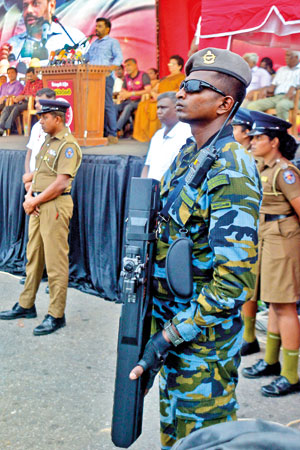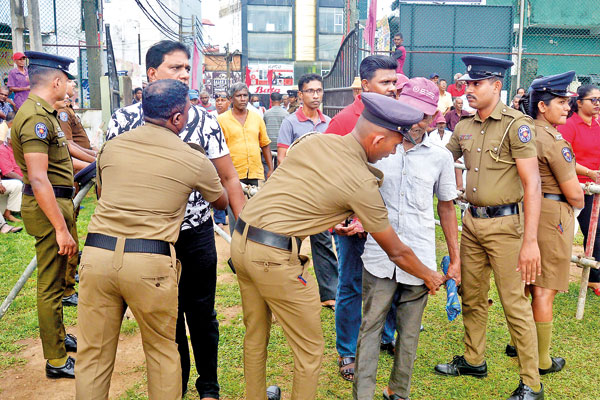News
Some candidates shed protection, but security shield in operation
View(s):By Nathara Abeywickrema
Stringent security measures have been implemented to ensure the safety of all 38 presidential election candidates.
The Police Media Spokesman, DIG Nihal Thalduwa, has announced the formation of a high-level security committee led by General Shavendra Silva, and secretary of the Ministry of Public Security. The committee also includes Senior Deputy Inspector General of Police, Asanka Karawita, who is in charge of elections and related activities.

Security at NPP rallies.
This committee is operational around the clock and plays a critical role in assessing and managing the security needs of candidates. Security is tailored based on the specific threats to each candidate. These threats are continuously monitored, and the security details are adjusted accordingly, he said.
Under the oversight of the Ministerial Security Division, each candidate is assigned a security team. These teams are required to report at all activities, from attending rallies and meetings to any other public appearances, to the committee. This allows for real-time security assessments and decision-making.
The committee’s operations are further bolstered by the collaboration of the special police unit, state intelligence service, and the tri-forces. Special attention is given to candidates facing higher levels of threat, with specially trained officers already in place to mitigate potential risks.
“While security measures are designed to be equal for all candidates, the level of protection provided is proportional to identified threats. This approach ensures that all candidates, including members of the clergy, receive the necessary protection, whether they are actively campaigning or not,” Mr. Thalduwa explained.
He said the comprehensive security framework reflects the government’s commitment to safeguarding the democratic process and ensuring the safety of all individuals participating in the presidential race.
Meanwhile, the Institute for Democratic Reforms and Electoral Studies (IRES) has raised concerns about the presidential election, highlighting issues with three candidates who have submitted nominations but remain inactive.
Manjula Gajanayake, executive director of IRES, noted one candidate who recently died, for whom there has been no official replacement. This reveals a significant flaw in the electoral process. He criticised the lack of transparency and urged for contingency plans, such as appointing a replacement from among current or former parliamentarians.
Mr. Gajanayake said that out of the remaining 38 candidates, only 15 have organised any meetings or public rallies, while 23 have not held any gatherings and remain silent.
He highlighted difficulties with candidates’ contact information, with some numbers being incorrect or calls abruptly ending. Furthermore, five candidates lack Meta (Facebook) accounts, three are inactive, and at least three have not made public statements about their candidacy. Still, these candidates continue to collect funds, raising concerns about their genuine intent and engagement.
To address these problems, Mr. Gajanayake proposes that the deposit be increased to deter misuse and to ensure that only serious candidates participate. He recommends that the deposit for candidates from registered political parties be raised to Rs. 2.6 million and for independents to Rs. 3.1 million.
He suggested that the Election Commission implement stricter regulations and oversight, including monitoring all 86 registered political parties and requiring independent candidates to gather at least 10,000 signatures. Mr. Gajanayake also advocates for the creation of budget offices to track election manifestos.
A specific point of contention is the high security detail of Field Marshal Sarath Fonseka, despite the fact that fewer than 10 people have attended his rallies. Mr. Gajanayake noted that this discrepancy further complicates the security and resource allocation.
In response to concerns about extensive security provided to Mr. Fonseka, despite small crowds at his rallies, DIG Thalduwa said that Mr. Fonseka is entitled to a higher level of security due to the unique threats he faces.

Pix by Eshan Fernando
Janaka Ratnayake, the former chairman of the Public Utilities Commission of Sri Lanka and a presidential candidate representing the United Lanka Podujana Party, has opted not to use state-provided security.
He relies on his private security team, citing a belief that he does not face a significant threat. He has requested three or four additional security guards as he embarks on a nationwide campaign, including planned pocket meetings in Galle, Matara, and Hambantota this weekend. He noted that about 60% of his campaign efforts are through digital media.
Siritunga Jayasuriya of the United Socialist Party has declined state security, emphasising that his party has never relied on it. Mr. Jayasuriya explained that he does not organise large rallies or meetings and plans to travel across the country without private security, focussing instead on directly engaging with the people.
Sanath Manamendra of the Nava Sihala Urumaya expressed dissatisfaction with the security arrangements. He noted that while he has been assigned two security officers, one is frequently on leave. Despite his request for four officers, this has not yet been granted. Although his campaign primarily relies on digital media, Mr. Manamendra plans to begin pocket meetings this weekend.
Independent Anthony Victor Perera has chosen not to use either private or state security. He plans to begin his campaign with pocket meetings in his hometown, Puttalam.
Dr. P.W.S.K. Bandaranayake of the National Development Front believes that a true leader who aspires to make a difference should not be fearful of engaging directly with the people. He has declined security, though he acknowledges that two officers maintain regular contact and visit his office daily. He said he avoids holding rallies or meetings that would unnecessarily waste resources.
Nuwan Bopage of the People’s Struggle Alliance has said he will not be requesting security. He expressed confidence in the protection provided by people, believing that their support ensures his safety.
A.S.P. Liyanage of the Sri Lanka Labour Party is satisfied with security arrangements provided for him. He noted that security has been significantly improved compared with previous elections.
Dr. K.R. Krishan, representing the Arunalu People’s Front, has expressed satisfaction with security for him. He has been assigned two security officers.
Janasatha Peramuna candidate Battaramulle Seelarathana Thera has expressed concern about the adequacy of his security arrangements, noting that only two officers had been assigned despite a request for six.
He said the government needs to be more considerate regarding security.
The best way to say that you found the home of your dreams is by finding it on Hitad.lk. We have listings for apartments for sale or rent in Sri Lanka, no matter what locale you're looking for! Whether you live in Colombo, Galle, Kandy, Matara, Jaffna and more - we've got them all!

